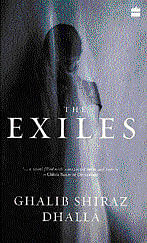
The exiles
Ghalib Shiraz Dhalla
HarperCollins
2011, pp 406
Rs. 350
They are exiled from their pasts, craving for something they were forced to leave behind.
They long to give and receive love, to return ‘home’. But peace and true love eludes them. Pooja speaks for all of them when she wonders if they can’t figure out where home is any more. They face tremendous upheavals in their private lives, which partly ensue from their own tragic yearnings and flaws. We admire their dignity and their capacity to reach beyond themselves and love another person, raising them above the selfish and shallow commonplace. As these memorable characters falter in their efforts to make sense of their lives, our hearts go out to them. We feel their burning pain and want to wipe their tears away. This profoundly moving quality is the novel’s greatest strength.
Atif, the illegal immigrant living on the fringes of life in LA, is a lonely soul banished by his parents back in Mumbai. Disappointed and angry at Atif’s alternate sexuality, his father would, if given a chance to live life over, have gladly snuffed out his son’s life at birth. His mother has strangled her maternal love to keep her marriage alive. When Rahul meets Atif, it is love at first sight. As they overcome their inhibitions and bond, they share a beautiful feeling. “Atif cried now not only for the love he knew Rahul felt for him, but also for the love he had lost, for his mother and father, all the rejections he had suffered until now, and the realisation that when at long last, love had arrived, it had been so that he would be able to neither claim nor keep it.”
Rahul and Atif love each other passionately, yet Rahul “wakes up next to a wife he has taken an oath to be with for his next seven lives.” While Atif wonders what he really has, Rahul is torn apart by his love for Atif, his habit of suppressing his true desires, and his sense of duty towards his wife and son. Rahul breaks down as he finally loses one love in order to gain another.
Rahul’s devoted wife Pooja seeks solace from her husband’s lack of warmth by turning to her pantheon of gods and cooking elaborate delicacies for her catering clients. When Rahul at last makes that inevitable move away from Pooja and into Atif’s arms, Pooja is torn between complete tenderness for him and an abrupt corrosiveness. She slowly begins to “resent him because it seemed he did not love her enough to fight for them, or even to appear disrupted.” Yet, she retains her innate humaneness toward both Rahul and Atif in the final disastrous moments.
The prose flows like a crystal clear stream, with rarely a needless word. The author dexterously weaves in references to Hindu mythology and romantic Sufi poetry. Every detail packs layers of meaning, and even the few minor characters are finely drawn. Thus Pooja’s red sticker bindi reflects her passionless conjugal life, used “not as much to propitiate the gods or mark her love for Rahul any more, but to make her look more exotic for the benefit of her wealthy clientele.”
When Rahul’s parents visit the Samji family in Kenya, they find a clutter of confused wealth; ornate gold leaf furniture combating with oriental room dividers, sumi-e paintings and Tibetan dragons. Rahul’s mother balks at the wealthy Samjis’ lack of class, and ironically exposes her own shortcomings by being inconsiderate to the housemaid.
In the hands of a lesser writer, the final denouement could easily have sunk into a filmi masala melodrama. Despite a close shave towards excess spiciness, the novel manages to end in a way that leaves an indelible imprint on the reader’s mind.